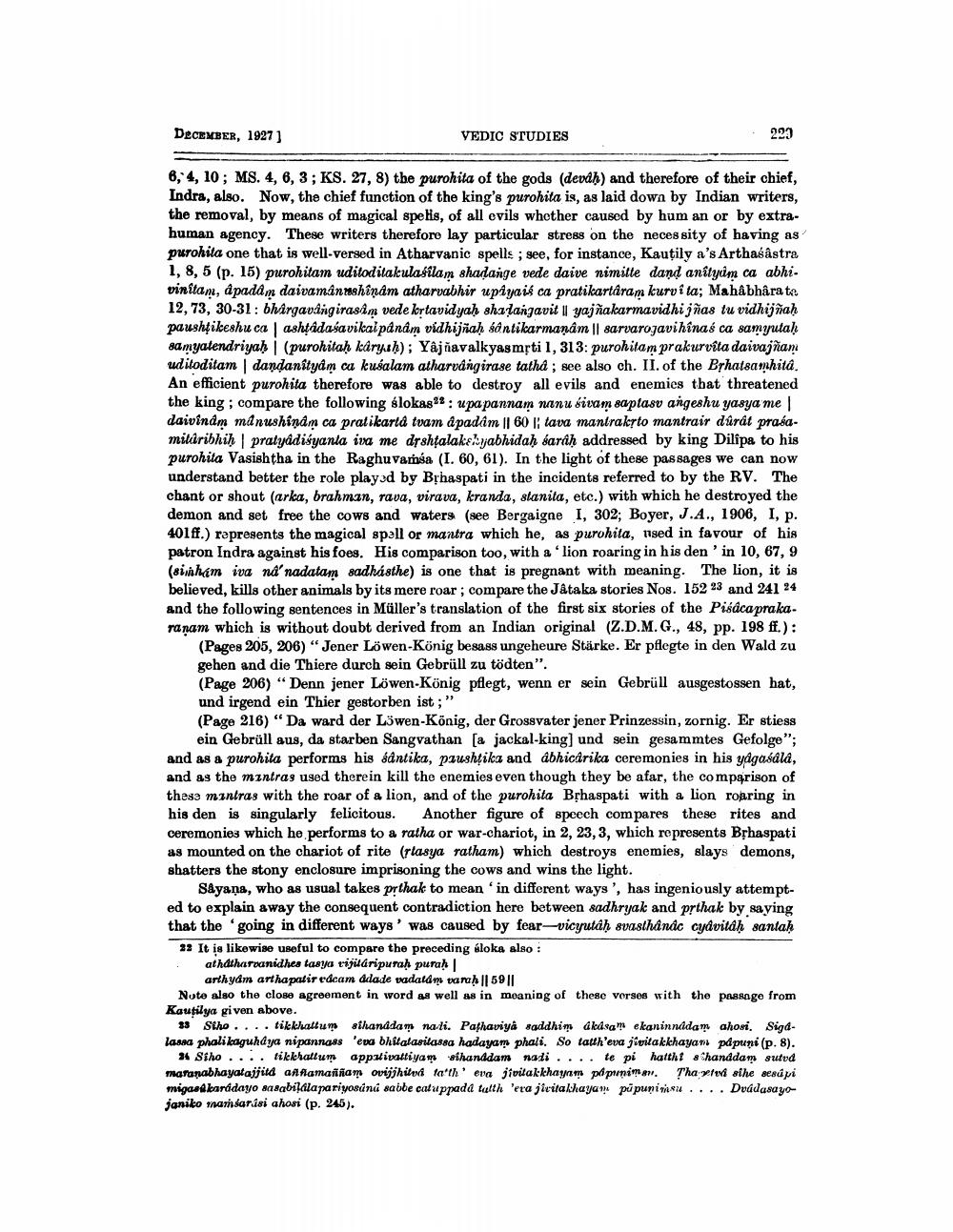________________
DECEMBER, 1927]
VEDIC STUDIES
* 223
6, 4, 10; MS. 4, 6, 3; KS. 27, 8) the purohita of the gods (devdh) and therefore of their chief, Indra, also. Now, the chief function of the king's purohita is, as laid down by Indian writers, the removal, by means of magical spe Hs, of all evils whether caused by hum an or by extrahuman agency. These writers therefore lay particular stress on the necessity of having as purohita one that is well-versed in Atharvanic spells ; see, for instance, Kautily a's Arthasastra 1, 8,5 (p. 15) purohitam uditoditakulasilam shadange vede daive nimitte dand anityim ca abhi. vinitan, dpadam daivamannshinam atharvabhir uplyais ca pratikartaram kurvita; Mahâbhâra ta 12, 73, 30-31 : bhargavangirasim vede krtavidyah shadangavit Il yajñakarmavidhijñas tu vidhijñaḥ paushţikeshu ca ashtadasavikaipánam vidhijñaḥ sôntikarmanám || sarvarojavihinaś ca samyutah samyatendriyah (purohitaḥ karyuh); Yâjñavalkyasmrti 1, 313: purohitam prakurvita daivajñam uditoditam dandanityam ca kućalam atharvangirase tatha ; see also ch. II. of the Brhatsamhitâ. An efficient purohita therefore was able to destroy all evils and enemies that threatened the king ; compare the following slokas28: upa pannam nanu bivam saptasv angeshu yasya me daivinam manushinam ca pratikarta tvam á padam || 60 l: tava mantrakyto mantrair dúrát prasa. mitiribhiḥ pratyádiśyanta ira me drshtalakskyjabhidah sarah addressed by king Dilipa to his purohita Vasishtha in the Raghuvamsa (I. 60, 61). In the light of these passages we can now understand better the role playod by BỊhaspati in the incidents referred to by the RV. The chant or shout (arka, brahman, rava, virava, kranda, slanita, etc.) with which he destroyed the demon and set free the cows and waters (see Bergaigae I, 302; Boyer, J.A., 1906, I, p. 401ff.) represents the magical spall or mantra which he, as purohita, insed in favour of his patron Indra against his foes. His comparison too, with a ' lion roaring in his den 'in 10, 67, 9 (simham iva nd' nadatam sadhásthe) is one that is pregnant with meaning. The lion, it is believed, kills other animals by its mere roar, compare the Jåtaka stories Nos. 152 23 and 241 24 and the following sentences in Müller's translation of the first six stories of the Pišáca prakaranam which is without doubt derived from an Indian original (Z.D.M.G., 48, pp. 198 ff.):
(Pages 205, 206) " Jener Löwen-König besass ungeheure Stärke. Er pflegte in den Wald zu gehen and die Thiere durch sein Gebrüll zu tödten". (Page 206) "Denn jener Löwen-König pflegt, wenn er sein Gebrüll ausgestossen hat, und irgend ein Thier gestorben ist;' (Page 216) "Da ward der Löwen-König, der Grossvater jener Prinzessin, zornig. Er stiess
ein Gebrüll aus, da starben Sangvathan [a jackal-king) und sein gesammtes Gefolge"; and as a purohita performs his såntika, paushţika and abhicârika ceremonies in his yagaśála, and as the mantras used therein kill the enemies even though they be afar, the comparison of these mantras with the roar of a lion, and of the purohita Bệhaspati with a lion roaring in his den is singularly felicitous. Another figure of speech compares these rites and ceremonies which he performs to a ratha or war-chariot, in 2, 23, 3, which represents Bphaspati as mounted on the chariot of rite (rtasya ratham) which destroys enemies, slays demons, shatters the stony enclosure imprisoning the cows and wins the light.
Sayaņa, who as usual takes prthak to mean 'in different ways', has ingeniously attempted to explain away the consequent contradiction here between sadhryak and prthak by saying that the 'going in different ways' was caused by fear-vicyutah svasthåndc cydvitaḥ santah 22 It is likewise useful to compare the preceding bloka also
athatharoanidhes tasya rijuaripurah purah |
arthyam artha patir edcam ddade vadalam tanah || 59 || Note also the close agreement in word as well as in meaning of these verses with the passage from Kautilya given above.
33 Siho .... tikkhattum sihanddam nali. Pathaviya saddhim akasa ekaninnddam ahosi. Sigalassa phalikaguhdya nipannass 'eva bhitatasilassa hadayam phali. So tatth'eva jivitakkhayan pápuni (p. 8).
74 Siho.... tikkhatlum appalivattiyamaihanddam nadi .... te pi hattht schanddam sutvd matanabhayatajjitd affamaññam ovijjhitud faith' eva jivitakkhayam papunime. Tha lui sihe sesúpi miga Akarádayo sasabilalapariyosdnú sabbe catuppada tutth 'era jivitakhaya pūpunisiau .... Dvadasayo janiko mansar.isi ahosi (p. 245).




